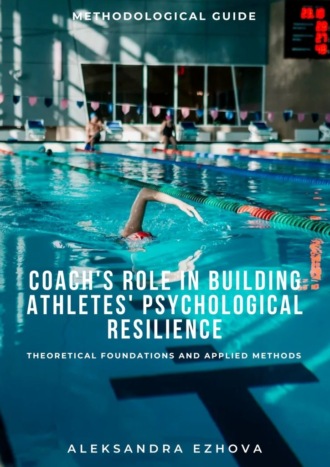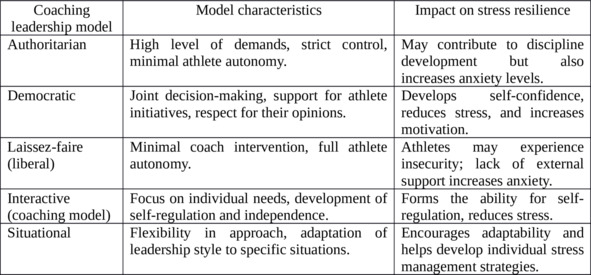
Полная версия
Coach’s role in building athletes’ psychological resilience. Theoretical foundations and applied methods
Leadership within the team also plays a crucial role in shaping psychological resilience. The influence of high self-regulation, stress resistance, and confidence of master athletes has a major impact on the psychological state of less competent athletes. Such models allow less competent athletes to build healthy coping strategies, improve self-esteem, and improve intrinsic motivation.
Thus, team climate exerts a significant influence on the psychological resilience of an athlete. A balanced combination of social support, positive competitive climate, and effective leadership assists in strengthening psychological flexibility, creating self-confidence, and developing stable mechanisms of self-regulation ensuring high-level sporting performance.
1.3. The role of the coach in developing psychological resilience
The coach has a great impact on the psychological resilience of an athlete since they determine training strategy, the target of performance, and form the attitude of an athlete toward breakthrough. The impact reaches the physical training itself and even more significantly reaches the emotional field of athletes, to their stress resistance and motivational skills [23]. The relationship between the coach and athletes, as well as the style of the coach, also affects the psychological atmosphere in the team and can enhance or destroy stress resilience.
An athlete’s psychological steadiness to a large degree rely on the order and climate of the training process. The optimum conditions are found by coaching strategy combining high requirements with support, uniting disciplined training with building athlete autonomy. One of the most important things is the coaching leadership, not only controlling the training process, but also creating stable motivational orientation, self-reliance, and emotional regulation skills. In a best-case model of leadership, the coach not only supports task achievement but also helps athletes learn cognitive coping skills for stress management, reducing pre-competition anxiety, and improving adaptability.
Different coaching styles have varying effects on an athlete’s psychological resilience. Sports psychology identifies several key coaching behavior models, which differ in their level of control, degree of support, and the extent to which athletes participate in decision-making (table 3).
Table 3. The influence of coaching leadership models on an athlete’s stress resilience

The effective work of a coach is not only aimed at the formation of physical and technical skills but also at the psychological preparation of sportsmen to deal with stressful situations. This is done by applying cognitive-behavioral correction methods, training in coping skills, and the development of self-regulation mechanisms. The coach must not only transfer demands and control but also create conditions for the formation of self-confidence, stable motivation, and emotional regulation skills.
In a study [24], in which the perceptions of coaches’ leadership by athletes in championship squads were studied, it was found that the most important aspects of coaching that contribute to the development of stress resilience are instruction and training (M = 3.96, SD = 0.63), democratic behavior (M = 3.61, SD = 0.79), and positive feedback (M = 3.49, SD = 0.71). These types of leadership assist in the development of self-control and confidence among sportsmen, particularly in tense competitive situations. Autocratic coaching behavior (M = 2.38, SD = 0.68), however, was scored by sportsmen as significantly lower, which indicates the inefficacy of a controlling style of management in developing psychological resilience.
Results of the Mann-Whitney U test showed that female athletes rated coaching leadership higher than male athletes (U = 5958.500, p <0.05), and team sport athletes perceived greater support from coaches compared to individual sport athletes (U = 4947.00, p <0.05). In addition, women team players emphasized more frequently the importance of democratic behavior of the coach, support from society, and positive feedback, whereas male individual players valued order and control more. As it is remarkable, athletes’ age could not influence the perception of leadership of coaches, which testifies to the high stability of preference across all phases of sports training.
A total of 236 young student-athletes participated in the study, representing championship teams in basketball, handball, volleyball, futsal, badminton, wrestling, and swimming. Data collection was conducted using a questionnaire based on Chelladurai and Saleh’s (1980) Leadership Scale for Sports (LSS), designed to assess athletes’ perceptions of their coaches’ leadership styles. The questionnaire comprised 40 items that were presented in five subscales: training and instruction, democratic behavior, autocratic behavior, social support, and positive feedback. Every statement was marked by the respondents on a five-point Likert scale (1 – “never” to 5 – “always”).
During this study, M (mean value) was used to identify how often athletes rated the frequency of some of the coaching leadership attributes, and SD (standard deviation) indicated the degree of variation in these ratings. To compare differences in independent groups (e.g., sport type or gender), the Mann-Whitney U test was used, which allowed identification of statistically significant differences in the perception of coaching leadership behavior.
These findings highlight the most effective forms of coaching interventions for building resilience to stress are guided direction, emotional support, and granting the athletes some autonomy. Coaches must not only provide technical directions but also set a positive psychological climate that helps build confidence and adaptive coping during pressure.
The ability of a coach to create a supportive environment where an athlete feels confident and motivated is of particular importance. There are four main components of a coach’s social support, each playing a crucial role in the athlete’s preparation process and the development of psychological resilience (fig. 8).

Figure 8. Components of coach’s social support
Appraisal assistance is communicated through constructive criticism, which allows sportsmen to objectively measure their performance, become aware of their progress, and coordinate their future training. Constructive evaluation should not merely identify mistakes but also emphasize successful periods of performance to reinforce the player’s confidence in their competence. Feedback should be immediate, objective, and positive in nature rather than negative. For example, a coach may apply the sandwich technique, where feedback is provided in the sequence of first pointing out the athlete’s strengths, then areas of improvement, and finally, proposals for correction. In so doing, the stress level is reduced, and the athletes can perceive criticism as an incentive to improve and not as a factor to ruin their confidence.
The emotional support of coaches can best be depicted by empathy, comprehension, and encouragement, wherever necessary for the alleviation of anxiety among athletes. If a coach worries about his/her players’ welfare, morally sides with them during adversity, and motivates them not only to play exceptionally but also to grow on an individual level, it provides self-assurance to athletes. It is especially necessary for coaches to assist sportsmen in dealing with failures, portraying them as part of perfection, but not as a fault on their part. The presence of the coach lowers the risk of emotional burnout and provides high sports involvement.
Конец ознакомительного фрагмента.
Текст предоставлен ООО «Литрес».
Прочитайте эту книгу целиком, купив полную легальную версию на Литрес.
Безопасно оплатить книгу можно банковской картой Visa, MasterCard, Maestro, со счета мобильного телефона, с платежного терминала, в салоне МТС или Связной, через PayPal, WebMoney, Яндекс.Деньги, QIWI Кошелек, бонусными картами или другим удобным Вам способом.

